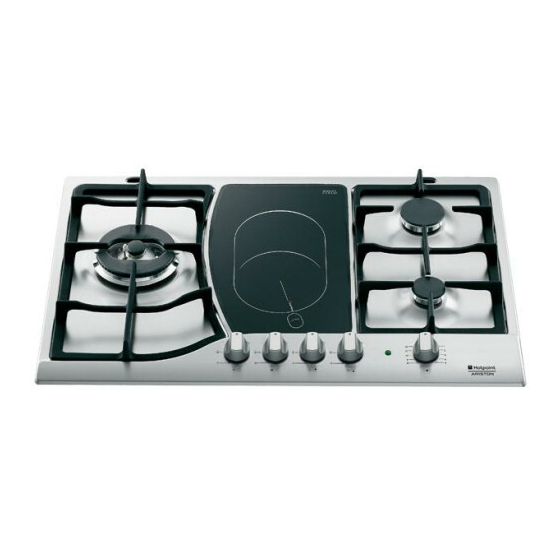Ariston PH 750 RT GH AUS Podręcznik użytkownika - Strona 3
Przeglądaj online lub pobierz pdf Podręcznik użytkownika dla Hob Ariston PH 750 RT GH AUS. Ariston PH 750 RT GH AUS 11 stron. Ariston hob
Również dla Ariston PH 750 RT GH AUS: Instrukcja obsługi (12 strony), Specyfikacje (13 strony), Instrukcja obsługi (12 strony)

Before cleaning or performing maintenance on your
appliance, disconnect it from the electrical power supply.
To extend the life of the cooktop, it is absolutely
indispensable that it be cleaned carefully and
thoroughly on a frequent basis, keeping in mind the
following:
Do not use steam equipment to clean the appliance.
•
The enameled parts and the glass top, if present, must
be washed with warm water without using abrasive
powders or corrosive substances which could ruin
them;
•
The removable parts of the burners should be washed
frequently with warm water and soap, making sure to
remove caked-on substances;
•
On cooktops with automatic ignition, the end of the
electronic ignition device must be cleaned carefully and
frequently, making sure that the gas holes are not
clogged;
•
Stainless steel can be stained if it remains in contact
with highly calcareous water or aggressive detergents
(containing phosphorous) for an extended period of
time. It is recommended that these parts be rinsed
thoroughly with water and then dried well. It is also a
good idea to clean up any spills;
•
Before using the ceramic glass module, the surface
must be cleaned, using a damp cloth to remove dust
or food residues. The ceramic glass surface should be
cleaned regularly with a soultion of warm water and a
non-abrasive detergent. Periodically, special products
will need to be used to clean the surface. First, remove
all food buildup or grease with a cleaning scraper, e.g.
(not supplied) (Fig. A).
Clean the cooking surface when it is still warm with a
suitable cleaning product (such as the one in the
Practical Advise on Using the Burners
For best performance, follow these general guidelines:
•
Use the appropriate cookware for each burner (see
table) in order to prevent the flame from reaching the
sides of the pot or pan;
•
Alwasy use cookware with a flat bottom and keep the
lid on;
•
When the contents come to a boil, turn the knob to
"Low".
Burner
Semi-Rapid (S)
Auxilliary (A)
Half-Fishburner (SP)
Triple Crown (TC)
Double flame (DCDR
internal)
Double flame (DCDR
external)
How to Keep Your Cooktop in Shape
Practical Advice
ø Cookware diameter (cm)
16 - 20
10 - 14
16 - 20
24 - 26
10 -14
26 - 28
Solutions product line available from any Merloni Elet-
trodomestici After-Sales Service Centre) and paper
towels. Then rub with a damp cloth and dry. Aluminum
foil, plastic items, objects made of synthetic material,
sugar or foods with a high sugar content that have
melted onto the surface must be removed immediatley
with a scraper while the cooking surface is still hot.
Special cleaning products for ceramic glass surfaces
form a transparent protective layer which fights diry
buildup. This also protects the surface from damage
caused by food with a high sugar content. Do not use
abrasive sponges or cleaning products under any
circumstances. This holds true for chemically aggres-
sive cleaners, like oven sprays and stain removers (Fig.
B);
Fig. A
Greasing the Taps
The taps may jam in time or they may become difficult to
turn. If so, the tap itself must be replaced.
N.B.: This operation must be performed by a technician
authorised by the manufacturer.
N.B. On the models supplied with a reducer shelf, remember
that this should be used only for the Double flame internal
(DCDR internal) burner when you use casserole dishes with
a diameter under 12 cm.
To identify the type of burner, refer to the designs in the
section entitled, "Burner and Nozzle Specifications".
Practical Advice on Using the Half Fish-Kettle
Burner
The two "Half Fish-Kettle" burners, are eliptic in form and
can be turned up to 90°. This makes the cooktop more
flexible in terms of how it can be used.
To turn the two burners 90°, proceed as follows:
•
Make sure that the burners are cool;
14
Fig. B
